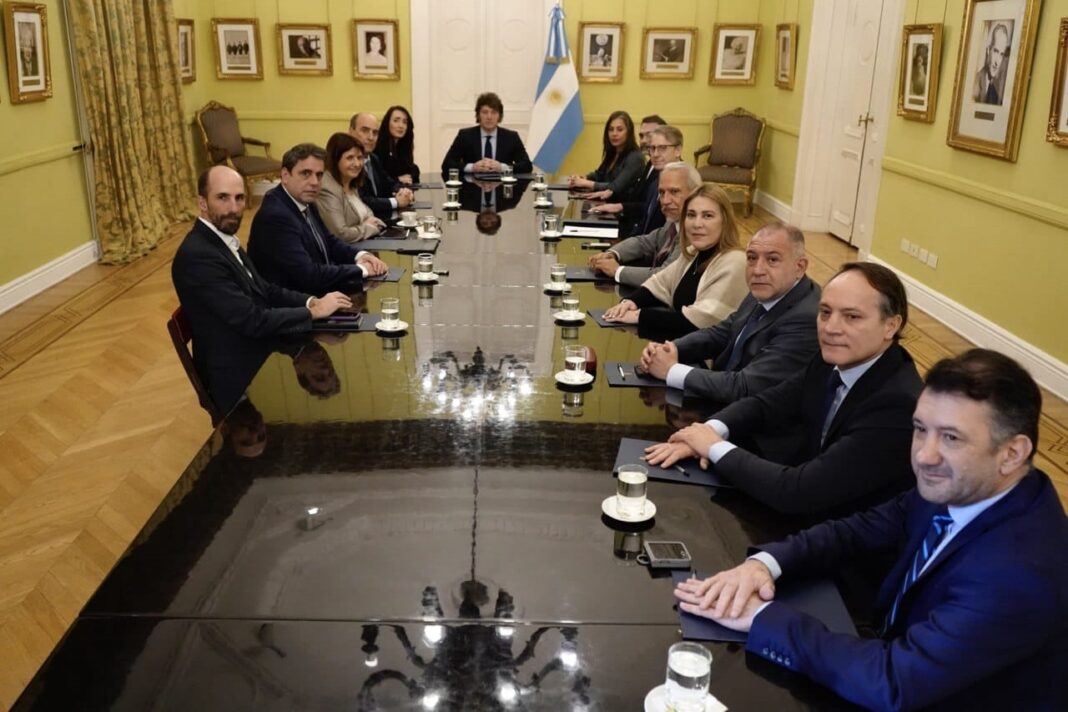BTN News: The Javier Milei government encountered a series of unexpected political defeats in the Senate this week, reflecting the fragility of its alliances and a lack of cohesive strategy. Despite successfully passing the bill for a “boleta única” in national elections, the government suffered significant blows when the Senate nullified the decree increasing the intelligence agency’s secret funds by 100 billion pesos and approved additional funding for universities. These developments underscore the precarious nature of Milei’s legislative support and signal potential challenges for his administration in navigating future political landscapes, including the critical 2025 budget proposal.
Unexpected Defeats in the Senate: Key Decisions Against Milei
The first major blow came with the Senate’s decision to annul the decree (DNU 656) that had increased the budget for the national intelligence services. Despite Milei’s attempts to delay the debate, including direct engagement with key allies, the move to reinstate the DNU on the agenda was led by radical senator Eduardo Vischi. This unexpected maneuver caught the government off guard, showcasing a lack of coordination and effective negotiation strategy from Milei’s team. The result: eleven of the thirteen radical senators voted against Milei’s interests, isolating the administration even further.
Rifts Deepen: Failed Negotiations and Fractured Alliances
The disarray within Milei’s camp was evident as accusations flew following the Senate vote. Advisors close to the President, like Santiago Caputo, were confident they had secured the Radical Civic Union (UCR) support after a lengthy meeting at Balcarce 50. However, Vischi, aligned with Corrientes Governor Gustavo Valdés, requested the DNU be included in the session’s agenda, which government officials perceived as a betrayal. “Vischi won’t be welcome in the Casa Rosada anymore,” a source close to Milei exclaimed in frustration.
Radical Opposition Strengthens: Political Motivations Behind the Vote
Radical senators had their reasons for opposing Milei. Internally, they viewed the DNU as unsustainable and sought to bring the issue to a definitive end. Moreover, recent negotiations between Milei and some UCR deputies regarding a veto on pension reforms had raised suspicions. Fearing any perception of a covert deal, the UCR senators chose to distance themselves from the administration, reinforcing their independence in the political arena.
Diverging Paths: Senators Break Ranks Over Key Votes
Throughout the session, it became clear that Milei’s legislative alliances were anything but solid. Even within traditionally aligned factions, cracks began to show. For example, senators aligned with Hugo Passalacqua of Misiones and Alberto Weretilneck of Río Negro chose to leave the floor rather than vote. Cordoba’s Alejandra Vigo, close to Martín Llaryora and Juan Schiaretti, opposed the decree, while differences emerged within Chubut’s delegation as Edith Terenzi rejected the DNU, and Andrea Cristina abstained. Meanwhile, representatives from Santa Cruz, aligned with Governor Claudio Vidal, actively joined the opposition to overturn the measure.
PRO’s Divided Stance: Macri’s Influence Wanes
The fractures extended beyond Milei’s immediate circle. The PRO, led by Mauricio Macri, resisted the decree to increase intelligence funds, but not without internal divisions. Despite Macri’s directive to oppose the decision, Luis Juez, head of the “yellow” bloc, and other members such as Carmen Álvarez Rivero and Beatriz Ávila, supported Milei’s position, displaying a surprising degree of independence. In contrast, Alfredo De Angeli, Guadalupe Tagliaferri, and María Victoria Huala sided with the opposition.
University Funding: A New Front in the Political Battle
Adding to Milei’s woes, the Senate also approved a law proposed by the opposition to increase funding for national universities—a move that further eroded government support. Only eleven senators stood by the administration, reflecting the volatility of Milei’s alliances. The government’s failure to secure backing from key figures like Luis Juez, Carlos Espínola, or Edgardo Kueider exposed deeper weaknesses. Although Milei received support from legislators close to Mendoza Governor Alfredo Cornejo, this proved insufficient. Outraged by the opposition’s maneuver, Milei announced a total veto of the law, citing a need to maintain fiscal balance.
Fragile Future: Milei’s Challenges in Building a Stable Coalition
The recent Senate defeats have cast doubt over the future of Milei’s government and its ability to push through critical legislation, such as the upcoming 2025 budget. With alliances crumbling and political agreements proving unreliable, the administration faces a challenging road ahead. The latest events underscore a lack of effective negotiation and strategy, raising questions about Milei’s capacity to maintain control and secure the necessary support in an increasingly fractured political landscape.
Conclusion: Milei’s Political Fortunes in Question
The defeats in the Senate illustrate the shifting sands of political loyalty and the difficulties Milei’s government faces in maintaining a stable coalition. As the administration struggles to navigate the complexities of Argentine politics, the future remains uncertain, with the upcoming budget debates likely to be a significant test of Milei’s leadership and negotiation capabilities.


